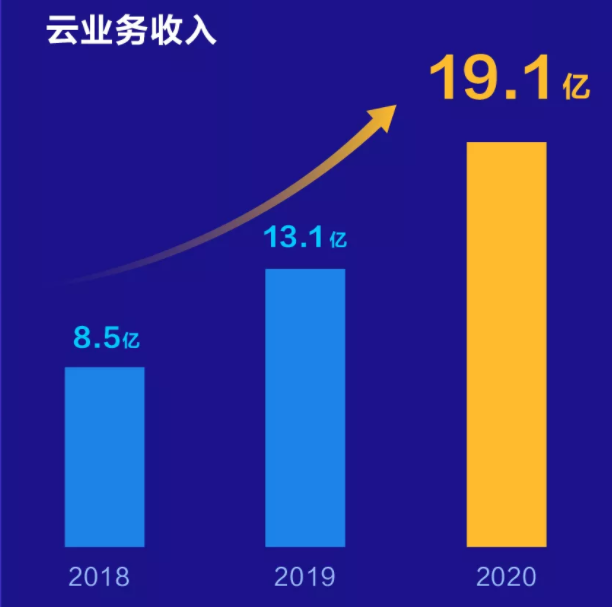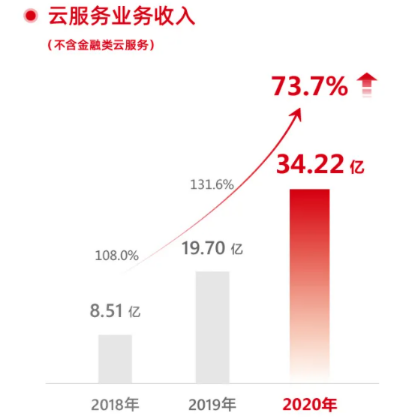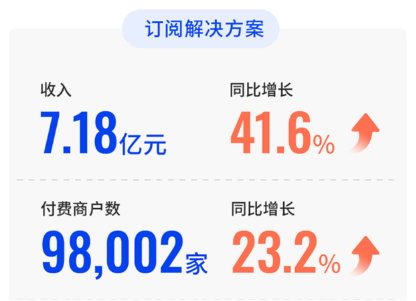Turn faster, the cloud business income accounted for more than half have
Editor’s note: This article is from the micro-channel public number “in Chile to observe” (ID: Hapiweb-soft6), Author: Chen Yang, proofreading: Sea policy.
The end of March is the day when companies’ annual financial reports are disclosed. Affected by the epidemic, the company’s 2020 financial report has attracted more attention. For most companies, the epidemic has undoubtedly adversely affected their operations. For ICT manufacturers, the digital demand generated by the epidemic is undoubtedly an opportunity.
For domestic ERP and OA software vendors such as UFIDA, Kingdee, Zhiyuan, Pan-Micro, and Lanling, 2020 will be even more special. In the past year, these ERP and OA software vendors have vigorously promoted cloud transformation. This makes us even more curious about their performance under the multiple factors of the epidemic, new infrastructure, and credit creation? What about the results of cloud transformation?
On the evening of March 24, Kingdee was the first to release its 2020 financial report; then on March 27, UFIDA disclosed its 2020 annual report; on the evening of March 30 just past, Fanwei released its 2020 financial report.
Next, let’s take a closer look at the cloud transformation of Kingdee, UFIDA, and Fanwei through the 2020 financial report.
01 Kingdee: Cloud business accounted for more than half, a year-on-year increase of 45.6%
Kingdee’s 2020 financial report shows: the total revenue in the past year was 3.356 billion yuan, an increase of about 0.9% compared with the 3.326 billion yuan in 2019; the loss attributable to the company’s owners was 335 million yuan, and the profit in the same period last year was 373 million yuan.
The performance of the cloud business is undoubtedly the highlight of Kingdee in the past year, and it is also the focus of Kingdee’s publicity in the financial report. In 2020, Kingdee’s cloud service business revenue will reach 1.912 billion yuan, an increase of 45.6% from the 1.31 billion yuan in 2019. Cloud service revenue accounted for 57% of the company’s total business, which is more than half. Last year, this proportion was 39.5%.
Look at the performance of the cloud business in detail. The revenue of Kingdee Cloud business mainly comes from three platforms: Kingdee Cloud·Sky for large enterprises, Kingdee Cloud·Xingkong for medium-sized enterprises, and Kingdee Cloud·Xingchen for small and micro enterprises.
Among them, Kingdee Cloud in 2020Cangqiong contributed 190 million yuan to Kingdee cloud business, a year-on-year increase of 220%. Kingdee revealed that Kingdee Cloud·Cangqiang signed 367 customers in the past year, with a total contract value of 467 million yuan. There are 283 new customers, including state-owned enterprises and state-owned enterprises such as State Power Investment Corporation, China Merchants Group, Yunnan China Tobacco, Qingdao Hisense, Zhejiang Communications Investment, etc.; also include Huawei, Honor, Xiamen Taikoo and other well-known large enterprises.
The revenue of Kingdee Cloud·Xingkong was 1.141 billion yuan, a year-on-year increase of more than 31.4%, and the customer renewal rate remained above 86%. Kingdee revealed that as of the end of 2020, Kingdee Cloud·Xingkong has accumulated more than 17,200 customers and has newly signed Huawei Marine, HKUST Xunfei, Megvii Technology, Yuanqi Forest and other well-known enterprises. At the same time, in 2020, a total of 1793 old customers of enterprise products will be upgraded to Kingdee Cloud·Xingkong.
Kingdee Cloud·Xingchen’s 2020 revenue Kingdee did not clearly disclose, but Kingdee said: Since its listing in 2020, Kingdee Cloud·Xingchen has won the trust of more than 3,000 customers, and the average subscription price is 4-5 of Jingdou Cloud. Times. Jingdou Cloud’s revenue has achieved a year-on-year growth of 62.4%, with more than 160,000 customers and a renewal rate of about 76%.
For Kingdee’s future cloud transformation plan, Xu Shaochun, Chairman and CEO of Kingdee Group, said: “Kingdee will continue to strengthen its cloud subscription model transformation strategy and rebuild a Kingdee with the cloud subscription model in the next three years.”
This is also the reason for the loss of 335 million yuan attributable to owners of Kingdee in 2020. Kingdee said: This is the group’s vigorous implementation of the cloud subscription model transformation strategy, actively stopping the sale of some ERP software license products and increasing R&D investment in cloud products such as Sky.
02 UF: Cloud business revenue is 3.422 billion yuan, a year-on-year increase of 73.7%
UFIDA’s 2020 financial report shows: The company’s total operating income in 2020 was 8.52 billion, a year-on-year increase of 0.2%; the net profit attributable to its parent was 990 million, a year-on-year decrease of 16.4%.
Yongyou also highlighted the performance of the cloud business in the financial report. In 2020, UFIDA’s cloud business (excluding financial cloud services) will achieve revenue of 3.422 billion yuan, a year-on-year increase of 73.7%; complete cloud advance receipts of 1,0911.25 million yuan, an increase of 83.9% from the beginning of the year; the proportion of cloud business revenue will also increase to 40 %, compared with 23.2% in 2019, an increase of nearly 17 percentage points.
In terms of the number of customers in the cloud business, UFIDA revealed that the number of customers who have paid for its cloud services has reached 601,600, a year-on-year increase of 17.5%.
For each type of cloud business, UFIDA said in its financial report: large and medium-sized enterprise cloud service business achieved revenue of 2.726 billion yuan, a year-on-year increase of 67.9%; small and micro enterprise cloud service business achieved revenue of 241 million yuan, a year-on-year increase of 65.2%; The cloud service business of the government and other public organizations achieved revenue of 456 million yuan, a year-on-year increase of 127.2%.
However, UFIDA did not specifically disclose the specific revenue of its cloud platforms/cloud services for various enterprises, such as YonBIP, YonSuite, Good Accounting, Good Business, Easy Account, etc., but only disclosed various types of cloud platforms/clouds. Customer performance of service.
For example, YonBIP for large enterprises has successfully signed a batch of over 10 million contract value in mid-2020, such as China National Nuclear Corporation, General Administration of Customs, China Metallurgical, China General Nuclear Power, China State Construction, China Shipbuilding, Sun Paper, etc. Group corporate model customers, and successfully signed SAIC, BMW (China) Automobile Trading Co., Ltd., China Banking and Insurance Regulatory Commission, Securities and Finance Corporation, Export-Import Bank of China, China National Tobacco Corporation, China Unicom Group Finance Co., Ltd., China International Television Corporation And many other industry benchmark customers.
YonSuite will have 500 new customers in 2020, covering the service industry, circulation industry, and manufacturing industry, including China Water Resources and Hydropower Fifth Engineering Bureau, Sichuan Supply and Marketing Cloud Technology Co., Ltd., Wuhan Public Transportation Group and a number of important state-owned enterprises, State-owned enterprise customers and their branches at home and abroad.
For 2021, UFIDA stated that it will continue to accelerate the strategic development of its cloud service business around the three key tasks of “strengthening products, occupying the market, and improving capabilities”, including increasing investment and speeding up the subsequent R&D of YonBIP; continue Maintain the technological leadership of UF YonSuite, and increase in-depth industry applications, customer stickiness and value applications.
03 Panwei: Working with enterprise WeChat to provide value-added applications
Fanwei’s 2020 financial report shows: in the past year, it achieved operating income of 1.482 billion yuan, a year-on-year increase of 15.27%; net profit attributable to shareholders of listed companies was 230 million yuan, a year-on-year increase of 64.28%; earnings per share were 1.1100 yuan.
Unlike the two ERP vendors, Kingdee and UFIDA, Pan-Wei, which provides OA applications, does not regard cloud service business as the focus of its financial report. In the financial report, the content related to cloud services is mainly its mobile office cloud OA-eteams product.
At the same time, whether it is a SaaS-based OA-eteams product, orIts traditional mobile office OA application e-cology products for medium and large organizations, and standard mobile office OA application e-office products for small and medium organizations. Feiwei did not disclose specific revenue and growth.
As for the cloud business product OA-eteams, Pan-Wei said that it fully integrates with enterprise WeChat to form a series of value-added application scenarios and solutions. By accepting the empowerment of inbound traffic, it forms a win-win business expansion extension for both parties.
Fen Micro said that new model applications represented by SaaS cloud computing and mobile applications have brought broad prospects for the development of collaborative management and mobile office software industry, and gradually become the main model of software services. It will continue to develop and upgrade eteams to meet the collaborative cloud office management needs of corporate customers.
In 2021, through the creation of a cloud aggregation platform, Pan-WeChat will promote its deep integration with enterprise WeChat, and aggregate more agents and partners, so that more applications will be gathered on the Pan-WeChat cloud platform.
04 Weimeng: SaaS revenue is 718 million, a year-on-year increase of 41.6%
When it comes to cloud service revenue, we have to mention the first SaaS stock in China-Weimob. Weimob’s 2020 financial report shows that in the past year, it achieved total revenue of 2.064 billion yuan, a year-on-year increase of 43.7%; net profit was 108 million yuan, a year-on-year increase of 39.1%, and achieved operating profit for three consecutive years.
However, what is different from previous years is that Weimob has adjusted its business disclosure method from the previous two parts of SaaS products and precision marketing to two parts of digital business and digital media, and digital business is divided into subscription solutions and merchants solution. Here, we can focus on subscription solution revenue, which is actually Weimob’s SaaS product revenue.
Specifically, Weimob’s SaaS revenue in 2020 was 718 million yuan, an increase of 41.6% from last year’s 507 million yuan. At the same time, the number of new paying customers was 37,506, an increase of 23.2%, and the total number of paying customers was 98,002.
At the same time, Weimob revealed in its financial report that in terms of cloud platforms, the developer platform will be upgraded in 2020 to provide developers with containers, database storage, cache storage, message arrays, microservice governance, web-IDE, etc. Infrastructure and tools.
In addition to standard SaaS products, Weimob also providesMerchants provide personalized and integrated services. Based on Weimob standard SaaS products, merchants can carry out extended services such as secondary development and system integration. At present, the number of applications of the service has exceeded 100 large businesses.
This is also the focus of Weimob’s cloud business in 2021. Weimob said: This year, it will increase its investment in PaaS cloud platform and promote the Weimob cloud platform to become a value integrator of digital business; it will expand more industry cloud services, such as focusing on expanding education and other industries in the commercial cloud field, and marketing The cloud field provides more digital marketing tools, and the sales cloud field accelerates the market expansion of products such as krypton.


